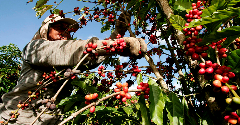News
DuPont introduces alternative to ascorbic acid
16 Oct 2018DuPont has introduced alternative to ascorbic acid for bakery products, claiming that DuPont Danisco GRINDAMYL SUREBake product range will enable bakers to produce cost effective, high-quality products.

DuPont has introduced alternative to ascorbic acid for bakery products, claiming that DuPont Danisco GRINDAMYL SUREBake product range will enable bakers to produce cost effective, high-quality products.
The rising costs of ascorbic acid is prompting many baking industry manufacturers to search for an alternative dough strengthener, DuPont believes, noting that regulatory measures on environmental compliance and control in China have caused price hikes on ascorbic acid to continue. This, the company says, poses significant challenges for bakeries to produce high-quality products while maintaining good profit margin. DuPont claims it is the only producer of hexose oxidase that is an alternative to ascorbic acid for bakery products. Unlike existing oxidative enzymes, the company says, the hexose oxidase technology present in the DuPont Danisco GRINDAMYL SUREBake product range can utilize many different sugar molecules as a substrate rather than just glucose alone. This, it says, helps improve the gluten network in dough systems through oxidization during mixing and fermentation, forming stronger bonds between the gluten, thereby giving a better production with a drier dough and thus no stickiness issue.“The price of ascorbic acid is still rising,” said Lee Lai See, Food Enzyme Business Director for ASPAC. “As many ASEAN manufacturers buy ascorbic acid from China, an increasing number of customers are switching to a GRINDAMYL SUREBake product fully or partially to buffer their cost. By using GRINDAMYL SUREBake, bakers will be able to reduce their production cost while maintaining the dough processability with improved baking performance such as better water absorption that result in bigger bread volumes.” According to DuPont, the GRINDAMYL SUREBake product range can be used in any process where flour requires an extra oxidative effect to create the desired properties and improvement of flours. The hexose oxidase is said to provide an excellent dough strengthening effect in the presence of oxygen and react with either mono- or disaccharides – unlike glucose oxidase, which is more dependent on flour variations and procedures. Hexose oxidase has a strong affinity for its substrates, which makes it a powerful biological oxidant.The strengthener can, DSM says, be used in various procedures and applications where a highly stable system is required. With the GRINDAMYL SUREBake product range, millers and bakers can expect to gain benefits in increased tolerance towards variations in processing parameters; reduced dough stickiness; increased water absorption; supplementation of chemical oxidants (including ascorbic acid, ADA etc); improved shape and dimensions of the final bread product; and increased bread volumeDuPont says that manufacturers who have used a GRINDAMYL SUREBake product have seen improved bread quality in various applications. The strengthener can also be used in various procedures where a highly stable system is required, such as frozen dough.Related news

UpSnack Brands acquires Pipcorn Heirloom Snacks and Spudsy
3 Jan 2025
Startup UpSnack expands with acquisitions amid hopes to make a mark in the better-for-you space with a diverse selection of upcycled ingredients.
Read more
EU calls to harmonise allergen labelling increase
1 Jan 2025
Allergy awareness efforts focus on implementing a European reference laboratory and collaboration to standardise labels and support allergen identification.
Read more
Is it time for a global definition of whole grain?
30 Dec 2024
Amid a lack of harmonisation, the European Food Information Council (EUFIC) is calling for a global definition of the term whole grain to end consumer confusion.
Read more
Coca-Cola waters down environmental targets on packaging, sustainable sourcing
24 Dec 2024
The Coca-Cola Company has changed its targets relating to water, packaging, climate, and agriculture, drawing fire from campaigners.
Read more
Chile's food labelling laws produce healthy results
23 Dec 2024
Chile’s warning labelling and marketing rules for unhealthy foods led to “significant decreases” in purchases of food and drinks with high levels of sugar, salt and fat, according to a study published in the journal PLOS Medicine.
Read more
How US soy exports shape Southeast Asian food
19 Dec 2024
As Southeast Asia and the US mark 20 years of trade, trends in soy, especially plant-based preferences, signal increasing demand for high-quality protein sources.
Read more
Coffee smallholders more sustainable than large-scale producers: Fairtrade
18 Dec 2024
Smallholder coffee plantations in Latin America are more climate-friendly than large-scale operations, according to an environment-focused study by Fairtrade Foundation.
Read more
Europe’s new strategies pave the way for alternative protein growth
12 Dec 2024
European countries such as Lithuania and the Netherlands are adopting strategic approaches to accelerate the development of alternative proteins, balancing innovation with food safety to drive sustainable food systems.
Read more
Brazil looks to expand agricultural export opportunities
4 Dec 2024
Agricultural trade agreements could contribute to sustainable food production in Brazil, according to politicians and key stakeholders from the Brazilian agricultural industry.
Read more
Concerns grow over EU-Mercosur deal
28 Nov 2024
The European Consumer Organisation, BEUC, has warned that the EU-Mercosur trade deal is likely to fail both consumers and farmers on sustainability goals.
Read more